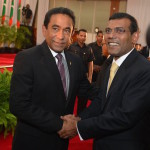A nationwide campaign against domestic violence dubbed “1 in 3” was launched Thursday by the Maldivian Network on Violence Against Women, a loose coalition of NGOs and individuals who came together to advocate for pioneering legislation on domestic violence (DV) currently before parliament.
The campaign title reflects the findings of a milestone 2007 study on Women’s Health and Life Experiences, which found that 1 in 3 women aged 15 to 49 experience either physical or sexual violence at some point in their lives, including childhood sexual abuse.
While a draft for domestic violence legislation had existed for several years, the opposition Dhivehi Rayyithunge Party’s (DRP’s) women’s wing announced the development of a bill to be submitted to parliament earlier this year.
The announcement was welcomed by President Mohamed Nasheed, who argued that a bipartisan effort to pass the legislation was more likely to succeed.
The DV bill, supported and facilitated by the United Nations Population Fund (UNFPA), aims to “make DV illegal, to prevent DV from occurring in our society, to provide justice to survivors of domestic violence and abuse as well as to ensure state responsibility in providing services to address DV-related crimes in society,” reads a press statement by the NGO Network.
The network was formed in October when a group of 30 advocates came together in Bandos to plan support for the bill.
On November 22, the bill was accepted by MPs and sent to committee for further review.
Taboo
In her keynote speech at the campaign launch, former DRP MP Aneesa Ahmed surveyed the history of government efforts against domestic violence.
As recently as the turn of the century, said Aneesa, domestic violence was a taboo subject in Maldivian society.
“It was not spoken about,” she said. “[People] didn’t want to speak about it. Perhaps because of the immensity of the problem, nobody wanted to talk about it; or because nobody wanted to believe how much it had spread in our society.”
She added that the hesitancy to openly acknowledge the problem was probably borne “out of fear.”
The former Women’s Minister revealed that a pilot survey planned by an NGO with support from the government was scuttled when it encountered resistance from societal attitudes, which held that the government should not “enter into family matters.”
“So we couldn’t carry out that survey,” she said. “The NGO I mentioned was very disappointed and we were very disappointed, but we did not give up.”
While the former government then attempted to foster public dialogue through workshops aimed at different groups of society, Aneesa said that she was “very encouraged” to see a campaign launched by a network of NGOs with high youth participation.
A video testimonial of a DV victim was also presented at the function, featuring a harrowing story of a woman who came to Male’ seeking a divorce but was refused by the judge who counseled reconciliation with her abusive spouse.
“I thought how am I going to make peace?” she asked. “I am finding it hard to endure. They didn’t consider in the least the abuse I was getting.”
The testimonial ended with a plea to MPs “to save women from abusive husbands.”
“A beginning”
Aneesa said that while the passage of the DV bill, with recommendations from the NGO network, would be “a beginning” to tackling gender based violence, she cautioned that the campaign “will not be easy” as the small size of close-knit communities “could be an impediment.”
However, she urged the NGO network and its affiliated advocates not to become discouraged and to continue their efforts.
Aneesa is a founding member of the ‘Hope for Women’ NGO which aims to “eradicate sexual violence against women and girls.”
President Nasheed meanwhile dedicated his weekly radio address yesterday to the subject of domestic violence, noting that “some women don’t even speak about it with their closest friends and family members” and consequently do not report abuse to the authorities.
Men taking advantage of physical superiority to abuse or subjugate women “amounts to the rule of the jungle,” he said.
As women make up half the country’s population, said Nasheed, greater participation of women in the workforce and in national affairs was crucial to ensure economic development and progress.
He added that sexual harassment in the workplace, “even subtle forms of harassment that we may otherwise think are trivial, should be deplored,” adding that “such things should never happen in the workplace.”
President Nasheed expressed gratitude for members of the DRP involved in the drafting of the legislation and pledged the government’s full support for the bill.
Upward trend
Statistics from the Family Protection Unit (FPU) reveal that since 2006 the unit has attended to an average of 145 patients per year – 87 per cent of whom were women – with a noticeable upward trend in the number of cases reported each month.
While sexual abuse was the most common form of abuse suffered by FPU patients, in 83 per cent of cases the perpetrator was a friend or family member, and was known to the victim.
Half of abuse victims reported that the perpetrator was a boyfriend or husband.
The “1 in 3” campaign – launched to coincide with the International Day for Elimination of Violence Against Women, the beginning of the annual global event supported by the UN: ’16 Days of Activism Against Violence’ – aims to raise awareness of the issue through a sustained media campaign over the next two weeks.
At the ceremony on Thursday, which was attended by Health Minister Aminath Jameel and UN Resident Coordinator Andrew Cox, the campaign was officially launched by Maldives National Defence Force (MNDF) Lieutenant Colonel Hamid Shafeeq with the unveiling of the campaign song “Geveshi Hiyaa”.






Excellent campaign. For too long we have been silent.
Hope this song will bring the issue of domestic violence to the attention of the public.
I thank Mr Moosa Ismail, the Councillor of F Bileddu who played the role of the violent husband here - a role that many felt reluctant to perform.
The wife's part was played by a young young lady of F Bileddu Nushu Jameel. She said the house in this video is built by her mother. It shows the traditional kitchen and stove.
The meaningful lyrics in this song is made by a young fisherman Abdullah Saeed whose daughter is in the video as well.
Thanks to F Bileddu people...
What about all the men who are victims of women's domestic violence? Women's domestic violence against men is grossly under reported, while male victims are still routinely being ignored by the taxpayer funded domestic violence industry. Credible research overwhelmingly shows that the ratio of d.v. is at least 50/50 between women & men. http://tinyurl.com/3sakk According to one study by researchers who work at the CDC, in 70% of domestic violence incidents, where the domestic violence is not mutual, it's women who initiate the domestic violence. http://tinyurl.com/yzm9xhe The taxpayer funded domestic violence industry has largely mischaracterized the true nature of d.v. from the beginning and continues to mislead the public. D.V. law follows a gender feminist agenda/ideology over facts in evidence and does great harm to many innocent men (and also many battering women who need help) as shown in "Los Misandry" http://www.youtube.com/watch?v=SAmOxvudpF8
American V.P. Biden recently called violence against women, "the very worst abuse." The very worst abuse is valuing one life less than another for having been born the wrong gender. Under domestic violence law the wrong gender is men. Shelter and services are virtually non-existent for male victims of domestic violence. Options out of a bad relationship, that women have, are often not available to men. Men wind up gender profiled and falsely accused by the taxpayer funded, domestic violence industry, because of gender feminist ideology controlling the d.v. industry. Men are often battered by domestic violence, and then battered again by the taxpayer funded, domestic violence industry as shown in "Los Misandry" at Youtube.
Little children are least able to contend with domestic violence in their families. Domestic violence will never end as long as the whole truth about it is misrepresented to comply with feminist ideology. According to the U.S. Dept of Health and Human Services and DOJ statistics, more kids are killed by neglect and abuse in a year (1,760 in 2007), than all the female intimate partner homicides in a year. Mothers are the single largest group of kid killers, according to HHS and they have a rate twice that of fathers. Nowhere near the money is spent to protect kids from kid killing mothers as is spent by the domestic violence industry to protect women. Involving the corrupt, taxpayer funded, d.v. industry in an attempt to prevent abusive and neglectful deaths of children is a big mistake. No place better characterizes the corruption of the taxpayer funded, domestic violence industry than "Los Misandry" at Youtube.
DV is real in this country, it is perpetrated mostly by male family members, including husbands, fathers, stepfathers, uncles, and other friends, such as boyfriends, family friends etc, against women and children. Everyone needs to work to eradicate this debilitating disease from this society.
I support the "Thinakun Ekeh" campaign and I think the "Geveshi Hiyaa" song is an accurate reflection of the issue in this country.
@Ray2447
I think you lost the plot here.
Suggest you look at the statistics in THIS country.
Please refer to :
http://minivannewsarchive.com/files/2010/10/Maldives-Study-on-Womens-Health-and-Life-Experiences-2007.pdf
Suggest you remove your head from its current place, where clearly the sun does not shine !!
Ray,
No offense, but your little tirade on the "tax payer funded domestic violence industry" which you claim to exist in the States has absolutely nothing to do with this. Firstly, you're purporting a view that has very little support or validity in the states. Secondly, we don't have any kind of direct taxes, only import duties. Thridly, to have any kind of domestic violence industry/group/endevour to raise awareness and resources to combat this issue would be one of the greatest assets this country has ever seen.
And while this campaign will focus on women, the hotlines, and mechanisms to address the situation that will hopefully be set up will provide for male abuse victims as well. Though the current statistics we have show very few physically abusive wives.
We have to start somewhere. It is better late than never. A good start and hope for all victims of abuse. I hope in continues 24/7 and not for 16 days. Thanks Moosa! a tough role well played. Great song great video. We will have to take one step at a time and never give up. Thanks for the helpers!
It is the unexplained fear that feeds the silence and people keep on suffering.
Beautiful and touching 🙂 with appreciation...
Standing up for womens rights does not mean that you are against mens rights. This is a human rights issue and a holistic approach is the only way forward. It is not an either/or game.
Totally agree with AZ. Great work! Great campaign! Many thanks to everyone involved. May our society be free of all kinds of injustice, starting at domestic level.
Great campaign, wish them all the best!
the campaign's name is Thinakun Ekeh. not 1 in 3. when you are writing about Munnaarudhoshugey Thuthu Didi, would you write Minaret-house Young Give Give?